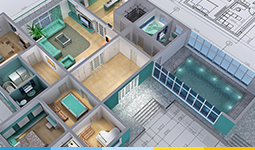More underwater homeowners emerge from negative equity
by Broderick Perkins
(1/23/2013) - As a cornerstone of the economy, the housing market doesn't only generate fuel to power growth when consumers buy a home.
Housing-related consumer spending also includes home furnishings, home improvements, upkeep and maintenance, as well as a host of purchases for items outside the home, including college education, business start ups, investments, debt-consolidation, cars, vacations and much more.
Much of that spending has been constrained or would be impossible without sufficient home equity.
That's changing and it's one of the reasons the economy is growing.
Another 100,000 homeowners reached a state of positive equity in the third quarter 2012. That's the point at which the home is worth more than the mortgage balance, giving some homeowners a little extra money to burn, according to CoreLogic.
That brings to 1.4 million the number of homeowners who breathed a sigh of relief as they reached a state of home equity nirvana by the end of the third quarter, 2012.
CoreLogic said nearly 10.7 million homes or 22 percent of all residential properties with a mortgage were still in a state of negative equity at the end of the same period. That's down from 10.8 million or 22.3 percent, in the second quarter, 2012.
Negative equity refers to a mortgaged home that is "underwater" or "upside down" and worth less than the mortgage balance.
Much of today's negative equity can be attributed to the housing market crash after unsustainable skyrocketing prices ran out of fuel. Negative equity can occur because of a market decline in value, an increase in mortgage debt or a combination of both. Likewise market increases in value and decreasing mortgage debt creates positive equity.
Toss in the negative equity sector with those in a near-negative equity state - borrowers with less than 5 percent equity in their home - and the combination accounts to 26.8 percent of all residential properties in the third quarter of 2012, down from 27 percent at the end of the second quarter 2012, CoreLogic reported.
Mark Fleming, chief economist for CoreLogic says, ironically, reduced inventories caused by underwater homeowners not going to market have helped boost prices and equity levels.
"The substantive gain in house prices made in 2012, partly due to tight inventory caused by negative equity's lock-out effect, has paradoxically alleviated some of the pain," Fleming said.
"With nearly one quarter of borrowers still underwater, we have a long way to go," said Anand Nallathambi, president and CEO of CoreLogic.
"As we look ahead into 2013, we expect to continue to see more borrowers escape the negative equity trap and that will be a strong positive for the housing market specifically and the broader economy generally," Nallathambi added.
CoreLogic also reported:
• Most negative equity is concentrated in the low-end housing market. For example, for low- to mid-value homes (less than $200,000), the negative equity share is 28.7 percent, almost twice the 14.6 percent for borrowers with home values greater than $200,000.
• Nevada had the highest percentage of mortgaged properties in negative equity at 56.9 percent. Next came Florida (42.1 percent), Arizona (38.6 percent), Georgia (35.6 percent) and Michigan (32 percent).
• Some 6.6 million upside down homeowners have first mortgages, but no home equity loans. The average mortgage balance for them is $214,000. The average underwater amount is $49,000.
• Another 4.1 million upside down homeowners have both first and second mortgages. The average mortgage balance for them is $298,000. The average underwater amount is $82,000.
• As of the third quarter 2012, there were 1.8 million homeowners who were only 5 percent underwater. If home prices continue increasing over the next year, these homeowners could emerge in a positive equity position.
Other related articles:
Room for risk? Hybrid ARMs at 29-year lows
Completed foreclosures drop 23 percent, signal strength in recovering economy
20.6 million homeowners are mortgage free - for better or for worse
Foreclosures down, but not out in many cities
Fiscal cliff clouds otherwise rosy outlook for mortgage delinquencies, foreclosures
Housing recovery not robust enough to reduce mortgage delinquencies
First-time home buyers not always enjoying full benefits of housing recovery
Smaller mortgages, fewer foreclosures sustain housing recovery
Fannie Mae & Jumbo Mortgage Rates
Just One Click! = Current Rate Chart

Start by selecting your state

Broderick Perkins
Home equity line of credit vs. home equity loan
Realty agents offer buyers pre-purchase credit, mortgage tips
Continued partisan attempts to undermine the CFPB victimize mortgage
Larger down payment crucial in today's low-inventory, multiple-offer housing market
Site to See: Freddie Mac's CreditSmart
Online mortgage videos a good mortgage news
Consumer Financial Protection Bureau may not be enough to clean up mortgage
How much home will the median price buy?
High-cost areas benefitting from jumbo loan boom
Mortgage credit slowly loosening, but many restraints still in place
Mortgage co-signing not what it used to be
Inside the lessons of homeownership counseling
What's to learn from homeownership counseling?
What can you do about higher FHA loan costs? Not a lot
Fundamentals apply when applying for a mortgage
Larger down payment prompts lender, seller largess
Erate Update: Which Way Mortgage Rates?
Mortgage banker vs. mortgage broker
The true cost of homeownership
No-marriage mortgages between couples are red flag parades
How much house will a conforming loan buy?
Real estate agents' role in the mortgage application process

Home Equity Line - Documentation
Home Equity Line vs Second Mortgage
Which Secondary Financing is best for me?
Home Equity Loans: Paychecks from your Home
Home Equity Loan Shopping: Tips and Types
Home Equity Line New Appraisal
Home Equity No Income Qualifier
Home Equity Typical Loan Terms
Home Equity Loan vs Refinance First Mtg
Second Mortgage, HELOC for Invest Prop
Use Your Home to Get Away: Home Equity Loans with Frequent Flyer Programs
Lower your monthly payments Debt Consolidation Calculator
